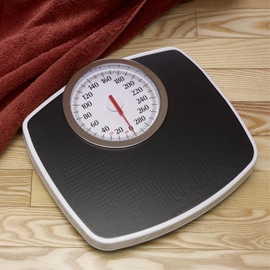Figuring Out your Healthiest Weight
This is a complicated process for a lot of people. For one thing, Hollywood projects an image of “thinness” and “healthy” that is highly warped. Celebrities who are border-line malnourished are bombarded with paparazzi attention every time their jeans look a tad too tight. This idealized concept of an optimal weight is not something that you should aim for. Instead, focus on working towards a healthy weight level for your height, build and activity level.

This is a complicated process for a lot of people. For one thing, Hollywood projects an image of “thinness” and “healthy” that is highly warped. Celebrities who are border-line malnourished are bombarded with paparazzi attention every time their jeans look a tad too tight. This idealized concept of an optimal weight is not something that you should aim for. Instead, focus on working towards a healthy weight level for your height, build and activity level.
Body Mass Index and You
Body mass index is the go-to scale for determining weight level. BMI is a universal measurement system. It uses your height-to-weight ratio to come up with a number that pertains to a certain scale. A BMI between 19 and 24.9 is considered healthy. If your BMI is over 25, then you may be overweight; higher than 30 and you might be considered obese. You can determine your own BMI by using an online BMI calculator.
While the scale isn’t perfect, it can give you a good idea as to where you currently stand. Your weight loss doctor can review this information and help you set a healthy weight loss goal.
Focus on Feeling Healthy
There are certain benefits that come with being at a healthy weight. Being overweight or obese is associated with a collection of uncomfortable and sometimes severe health conditions. These include:
- Heart disease
- Type-2 diabetes
- Hypertension
- High cholesterol
- Sleep apnea
- Depression
- Migraine headaches
- Osteoarthritis
Often, these conditions come on slowly and may become chronic. There is a chance that you might not even associate a certain ailment with your weight, but as you lose weight you may start to physically feel better.
As you approach a healthy weight level, you might notice small changes in your day to day life. You may wake up feeling less fatigued and have more energy throughout the day. Doing simple tasks like walking the dog, climbing up the stairs or playing with your children may not be as tiring. Once frequent headaches might grow to be fewer and far between.
Physical changes in your health like these can lead to positive boosts to your emotional and mental well-being, helping you to feel more confident in yourself and better able to cope with factors that once caused you a severe amount of stress.
Small improvements may be noticeable soon after you start losing weight, but as you approach your healthy weight level they are likely to become even more evident. Having a numeric goal that you are working towards can give you clear direction and an easy way to measure progress as you lose weight, but don’t lose sight of the way you feel. Losing weight is about improving your health. When you reach your ideal weight, the health benefits will be noticeable.




